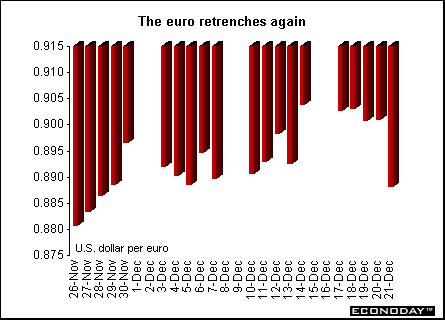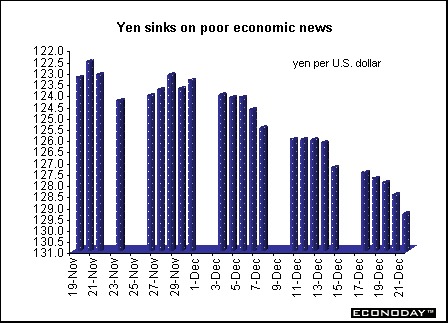
Currencies
The euro weakened on a combination of comments by European Central Bank president Wim Duisenberg plus a mix of weak economic data and forecasts. Besides these factors, the euro suffered from whiplash on euro/yen cross trading. Duisenberg dashed the hopes for an ECB interest rate cut early next year. In testimony to the European Parliament, he said the ECB now sees rates as appropriate for the "foreseeable future", a phrase which signals that rates will be on hold for the next several months. His comments make it clear that barring a major shock - such as a rapid appreciation of the euro exchange rate - the Governing Council will need at least several more months' data to convince them of the need for further easing. The ECB's stand isn't made easier by the far gloomier prospects for Europe compared with the United States. In addition, structural reforms are long overdue and there is the prospect of new countries entering the EU in 2004.

The French government has joined other EMU members to say that economic growth has ground to a halt in the fourth quarter and will expand only 0.1 percent in the first three months of next year. With the United States, Germany and Japan shrinking for the first time since 1974, it is obvious that France could not escape what is happening around it. French exports, which account for 26 percent of gross domestic product, are shrinking because of weaker demand.
All year, Japanese officials called for a weaker yen, hoping to boost profits at exporters such as Toyota Motor Corp. And the pace of verbal intervention has picked up markedly of late. Many investors now say the plan worked too well - and is causing unexpected damage. As if Japan's third recession in a decade wasn't reason enough for investors to shun Japanese stocks and bonds, the yen's decline since September means those assets are worth even less. The Bank of Japan changed policy to add more money to the economy, the latest attempt to encourage lending, which hasn't risen in five years. The move follows the International Monetary Fund's call that Japan needs to print money to counteract the dangers of deflation, even at the expense of a weaker yen.

The yen fell to a three year low against the dollar after the Bank of Japan lowered its economic assessment for a seventh month. The bank said that the economy is deteriorating broadly. That suggests the bank may again try to boost growth by adding more money to the economy.


Introduction • Global Stock Market Indexes • Recap of Global Markets • Currencies • Indicator Scoreboard

The Bottom Line • Looking Ahead
|